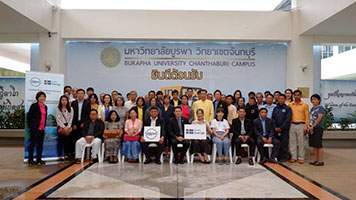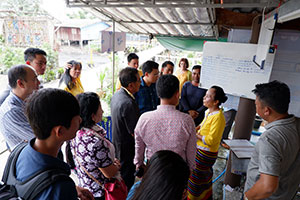 The SEAFDEC-Sweden Project, Sustainable Development Foundation (SDF) of Thailand, and Burapha University Chanthaburi Campus co-hosted the National Forum to share lessons learned and knowledge of fisheries communities on fisheries resources and habitat management on 6-7 August 2019 at Burapha University Chanthaburi Campus, Chanthaburi Province, Thailand. The aims of the National Forum were to 1) disseminate experiences and lessons learned from the activities implemented by the SEAFDEC-Sweden Project to relevant organizations/sectors and youth, 2) raise the awareness of the coastal communities on livelihood, fisheries, and coastal ecosystem, and 3) enhance relationship among government, organizations, academic institutions, and communities. The National Forum was participated by more than 120 various stakeholders from the government, communities, conservation groups, lecturers and students as well as representatives from Cambodia. The National Forum highlighted the results of the activities under the project Towards an Ecosystem-based Approach to Fisheries Management in Trat Bay carried out by the SEAFDEC-Sweden Project in collaboration with SDF during 2016-2018 in Trat Province in Eastern Thailand. The activities focused on 1) strengthening and building the capacity of the communities on the development of local organizations, habitat restoration, 2) raising awareness of the benefits of local knowledge, and 3) addressing gender and climate change issues and relevant sustainable development goals. Through the project’s interventions, the small-scale fishers established the Trat Bay Fishers Network The project also supported local women to form groups to enhance their status and strengthen their roles in the development and management of community livelihood enterprises.
The SEAFDEC-Sweden Project, Sustainable Development Foundation (SDF) of Thailand, and Burapha University Chanthaburi Campus co-hosted the National Forum to share lessons learned and knowledge of fisheries communities on fisheries resources and habitat management on 6-7 August 2019 at Burapha University Chanthaburi Campus, Chanthaburi Province, Thailand. The aims of the National Forum were to 1) disseminate experiences and lessons learned from the activities implemented by the SEAFDEC-Sweden Project to relevant organizations/sectors and youth, 2) raise the awareness of the coastal communities on livelihood, fisheries, and coastal ecosystem, and 3) enhance relationship among government, organizations, academic institutions, and communities. The National Forum was participated by more than 120 various stakeholders from the government, communities, conservation groups, lecturers and students as well as representatives from Cambodia. The National Forum highlighted the results of the activities under the project Towards an Ecosystem-based Approach to Fisheries Management in Trat Bay carried out by the SEAFDEC-Sweden Project in collaboration with SDF during 2016-2018 in Trat Province in Eastern Thailand. The activities focused on 1) strengthening and building the capacity of the communities on the development of local organizations, habitat restoration, 2) raising awareness of the benefits of local knowledge, and 3) addressing gender and climate change issues and relevant sustainable development goals. Through the project’s interventions, the small-scale fishers established the Trat Bay Fishers Network The project also supported local women to form groups to enhance their status and strengthen their roles in the development and management of community livelihood enterprises.
 In addition, the SEAFDEC-Sweden Project and SDF Team and representatives from Cambodia visited the study sites in Mai Root Sub-district and Leam Krad Sub-district in Trat Province on 8 August 2019. During the technical visit, the participants were able to learn, share, and exchange knowledge on activities in the coastal communities including waste management, crab bank, rehabilitation of fishery resources, and alternative livelihoods (homestay and eco-tourism, fish products, and so on).
In addition, the SEAFDEC-Sweden Project and SDF Team and representatives from Cambodia visited the study sites in Mai Root Sub-district and Leam Krad Sub-district in Trat Province on 8 August 2019. During the technical visit, the participants were able to learn, share, and exchange knowledge on activities in the coastal communities including waste management, crab bank, rehabilitation of fishery resources, and alternative livelihoods (homestay and eco-tourism, fish products, and so on).
 SEAFDEC Southeast Asian Fisheries Development Center
SEAFDEC Southeast Asian Fisheries Development Center